Daniel Garber talks to Russian director Aleksey Uchitel at TIFF13 about his new film Break Loose
Hi, this is Daniel Garber at the Movies for culturalmining.com
and CIUT 89.5 FM.
It’s the end of the millennium, downtown Leningrad, a drunken Boris Yeltsin babbling on the TV.
Law and order has collapsed, giving way to rule of strongest. The oligarchs are taking over — factory workers don’t get paid. Instead, gangsters and an untrained paramilitary beat them into submission.
Thrust into this world are four young toughs, best friends, fearless and nihilistic. They work for OMON, the corrupt local police. They cruise along the city’s grand boulevards in a broken down jalopy.
One of them falls in love with a beautiful woman dressed in white at a local night club. But his easy life of drunken brawls is heading for disaster when he discovers his dream girl is the girlfriend of a gangster boss.
I’m talking about BREAK LOOSE, a new movie that had it’s world  premier at the Toronto International Film Festival last night. I caught up with Alexey Uchilev — the well-known Russian filmmaker famous for epics like THE EDGE — at TIFF13.
premier at the Toronto International Film Festival last night. I caught up with Alexey Uchilev — the well-known Russian filmmaker famous for epics like THE EDGE — at TIFF13.
He talks about changes to Russia, fatalism, censorship, A Clockwork Orange, and more.
Arab Women Directors. Movies Reviewed: The Square, Wadjda, When I Saw You PLUS TIFF13, TPFF
Hi, this is Daniel Garber at the Movies for culturalmining.com and CIUT 89.5 FM, looking at high-brow and low-brow movies, indie, cult, foreign, festival, documentary, genre and mainstream films, helping you see movies with good taste, movies that taste good, and how to tell the difference.
 Cloaked in mystery and sensuality, western views of an oil-rich but treacherous “orient” dominated our image of the middle east for decades. Orientalism ruled. More recently, the narrative has shifted to that of an aggressive, terrorist super-villain poised to take over Europe and North America.
Cloaked in mystery and sensuality, western views of an oil-rich but treacherous “orient” dominated our image of the middle east for decades. Orientalism ruled. More recently, the narrative has shifted to that of an aggressive, terrorist super-villain poised to take over Europe and North America.
We hear news, daily, about Arab countries, but rarely do we hear voices from them. Arab voices are muffled or silenced in Western media. And Arab women are said to be stifled within these cultures. But is this the case? This week I’m talking about three movies, all in Arabic, and all from female filmmakers who prove to be anything but silent.
There’s an up-to-the-minute documentary about the protests at Cairo’s Tahrir Square; a sweet drama about a contemporary Saudi girl; and a historical drama about a Palestinian boy and his mom, refugees in Jordan immediately after the 1967 war.
Dir: Jehane Noujaim
What you’re hearing (on the podcast version) are the voices of protesters in Tahrir Square in 2011. They’re calling for Mubarek – a dictator for three decades – to step down. What’s unique about these protesters is how inclusive they were. Muslims and Copts, religious and secular, artists, academic and revolutionaries, young and old. They all come together around a small patch of Cairo green. With sound of fireworks bursting overhead, they force Mubarek to step down, the military to bring in a new constitution, and hold Egypt’s first national democratic election.
The Muslim Brotherhood — a fundamentalist political party that had been jailed and persecuted for decades by the military — arises as the only large-scale organized group. They distribute oil and food to potential voters and win the election by close margin. But soon enough, Morsi begins to act much in the same way as Mubarek had done, gathering power for his own faction not for the country as a whole.
This exciting documentary combines brand-new footage taking us from the first demos to Morsi’s fall this summer. What’s really special about it, though, is how the doc follows a half-dozen of the protesters – from all of the groups involved – who personify the demonstrations. An actor, a student, an activist, a graffiti artist, a member of the Brotherhood, they represent all Egyptians. This is raw, frontline footage: some of the protesters get brutally beaten or imprisoned, others run for their lives during a chaotic government crackdown.
first demos to Morsi’s fall this summer. What’s really special about it, though, is how the doc follows a half-dozen of the protesters – from all of the groups involved – who personify the demonstrations. An actor, a student, an activist, a graffiti artist, a member of the Brotherhood, they represent all Egyptians. This is raw, frontline footage: some of the protesters get brutally beaten or imprisoned, others run for their lives during a chaotic government crackdown.
Most chilling of all are the one-on-one interviews (in a chauffeured limousine) with an all-powerful military officer. He dismisses the demonstrators, the constitution and democracy itself as trivial events in his machiavellian view of Egypt. Sadly, it is the military running that country again.
Dir: Haifaa Al Mansour
Wadjda (Waad Mohamed) is a rebellious girl who lives with her mom. She’s into black Converse running shoes, blue jeans, mixed cassette tapes and soccer… and she’s intrigued by the concept of blue nail polish. She’s not much interested in religion, school or traditional women’s roles. And she lets people know when they’re pissing her off. So when she meets a kid named Abdullah who beats her in a race (her on foot, him on a bike) she decides to get a bike of her own so she can beat him. The thing is, Wadjda lives in Saudi Arabia and her school is a madrassa! And, she is told, girls shouldn’t ride bikes in Saudi Arabia.
She decides to enter and win a Koran recital contest so she can buy the  bike with the prize money. Has she suddenly become religious, and changed her attitude? (That’s what the school principal wants to happen.) Are they wearing her down? Or will she stick to her principles? And will she and her mother be relegated to side roles if her dad marries a second wife?
bike with the prize money. Has she suddenly become religious, and changed her attitude? (That’s what the school principal wants to happen.) Are they wearing her down? Or will she stick to her principles? And will she and her mother be relegated to side roles if her dad marries a second wife?
Wadjda is a fascinating look at the lives of girls and women in Saudi Arabia. This filmmaker is no softie; she shows a realistic view of both the oppression of women, as well as their everyday lives. Girls are taught never to laugh out loud, lest it distract nearby men; to cover their faces if a man comes into view; and they need a male driver to get anywhere (driving a car is still illegal for women in Saudi Arabia). It’s a country of religious rules and special permits, with South Asian workers doing the less desirable service roles.
But it’s also a country full of ordinary people doing ordinary things – yes, just like anywhere else. As a movie, Wadjda is a real delight. A simple story, but one that rings true.
When I Saw You
Dir: Annemarie Jacir
 Tarek is Palestinian boy who likes math and hates slimy food. But immediately after the 1967 war, he and his mom suddenly find themselves in a refugee camp in Jordan. He doesn’t like it there. Where’s his teacher? Where’s his dad? Where’s his home, his bed, his indoor toilet? And how come they don’t let him go to school?
Tarek is Palestinian boy who likes math and hates slimy food. But immediately after the 1967 war, he and his mom suddenly find themselves in a refugee camp in Jordan. He doesn’t like it there. Where’s his teacher? Where’s his dad? Where’s his home, his bed, his indoor toilet? And how come they don’t let him go to school?
He knows he’ll be going home soon, he’s not that far away. But he grows disheartened when he meets an old woman who says she’s been in the camp… since 1948! Refugees are treated terribly by urban Jordanians, but the newest refugees are treated worst of all. One day, he sees Yassir Arafat on TV saying the world is about to see a new kind of Palestinian — helpless  refugees no more.
refugees no more.
So Tarek runs away from the camp, away from his mother. He’s found in the desert by a bearded guy who had recently left the camp to become a fedayeen – a revolutionary fighter.
He finds himself in a secret war camp: it’s 1967. No prayers, just long hair and hippy beards, and women with ponytails. They all sing wistful songs around a campfire. No Koran in sight, just a copy  of Mao’s Little Red Book. From each according to his means, to each according to his needs…
of Mao’s Little Red Book. From each according to his means, to each according to his needs…
The boot camp is led by a older man with the war nickname Abu Akram. He wants Tarek to go back to the refugee camp – but the kid is stubborn, and eventually wins him over. And when his mother catches up with them, she sets up camp there too.
Will Tarek and his mom make it back to their village, just across the newly-fenced border?
When I Saw You is a revelatory film; the roots of the post-1967 situation of Palestinian refugees as seen through one determined boy’s eyes. It gives a completely different view — I’d say a completely opposite view — of the fedayeen. Known for decades in North America as the “Palestinian terrorists”, they are portrayed here as freedom fighters who just want their homes back. When I Saw You provides a singularly different historical narrative from the one you’re used to.
A good, fascinating film.
 The Square premiered at TIFF13, Wadjda opens next week in Toronto, check your local listings, and When I Saw You opens the Toronto Palestine Film Festival on Sept 28 at 6:30 (go to tpff.ca for details). And Toronto filmmaker John Greyson and Dr Tarek Loubani are still being held in an Egyptian prison. They are now on a hunger strike — go to tarekandjohn.com to find out more.
The Square premiered at TIFF13, Wadjda opens next week in Toronto, check your local listings, and When I Saw You opens the Toronto Palestine Film Festival on Sept 28 at 6:30 (go to tpff.ca for details). And Toronto filmmaker John Greyson and Dr Tarek Loubani are still being held in an Egyptian prison. They are now on a hunger strike — go to tarekandjohn.com to find out more.
This is Daniel Garber at the Movies, each Friday morning on CIUT 89.5 FM and on my website, culturalmining.com
Eastern Europe at TIFF13. Films reviewed: The Burning Bush, Ida, Le Grand Cahier
Hi, this is Daniel Garber at the Movies for culturalmining.com and CIUT 89.5 FM, looking at high-brow and low-brow movies, indie, cult, foreign, festival, documentary, genre and mainstream films, helping you see movies with good taste, movies that taste good, and how to tell the difference.
Eastern Europe used to have a specific meaning — not so much geographical as political. It meant the countries  behind the iron curtain. Western Europe was allied with the US, Eastern Europe with the Soviet Union. And it meant the barrier to those scary “Asiatic” hordes waiting to swarm, en masse, across Western Europe to enslave us all.
behind the iron curtain. Western Europe was allied with the US, Eastern Europe with the Soviet Union. And it meant the barrier to those scary “Asiatic” hordes waiting to swarm, en masse, across Western Europe to enslave us all.
Now, though, there is no eastern Europe anymore. Just Europe. Maybe mittel-Europe if you want to be fancy about it. But the old Eastern Europe lives on in the minds and films of the countries that suffered the brunt of two World Wars, and both Nazi and Stalinist occupations.
So, this week I’m looking at some really good movies, all from Eastern Europe, all from TIFF. They come from the Czech Republic, Poland and Hungary: all historical dramas, two set in the 1960s and one in 1944.
Dir: Agnieszka Holland
In January, 1969, Jan Palach – a history student at Prague’s Charles University – walks into Wenceslaus square with a bucket. He pours the liquid all over himself then sets himself on fire. He’s rushed to a hospital to treat his burns, but is barely alive. He immediately becomes a symbol of Czech opposition to the invasion of the country by Russian tanks to crush the short-lived Prague Spring.
The Party overlords want his story silenced, or the narrative stripped of any political significance. The Czech investigator looking into the case doesn’t want the Russians to impose martial law. His political allies at the university – students and some professors – want his story told. And his family – his older brother and his mother, the ticket seller at a remote train station – are devastated when they discover what happens.
But when a privileged party hack makes the papers when he states Jan Palach not only was working for the west, but never intended to burn himself alive. Jan’s steadfast mother decides to sue the man who made the speech, with the help of a sympathetic lawyer, a woman, and a young idealistic university student. But the wrath of the party is let loose all around the main characters, with midnight phone calls, men in black cars parked outside their homes, and mysterious disappearances.
The Burning Bush is an epic, four-hour-long story, (originally made as a Czech mini-series, in four, one-hour parts.) It has many diverse plot lines and dozens of characters. It alternates between the hope Jan Palach’s action inspired, and the dread of authoritarian rule that fought against him and his allies.
But it stands up beautifully all-together. The director, the renowned Agnieszka Holland (Europa Europa, Olivier Olivier, In Darkness) follows this gripping story all the way through. It had me glued to the screen.
Dir: Pawel Pawlikowski
Anna (Agata Trzebuchowska) was an orphaned baby in WWII Poland, left at a nunnery near Lodz. She wears a plain grey dress and covers her hair. She’s quiet and obedient. Now 16, she’s ready to take her vows, become a nun, but Mother Superior insists first she speak to her only known relative, her aunt Wanda Gruz (Agata Kulesza). But why?
Wanda is a woman of the world. She wears lipstick, smokes cigarettes and listens to jazz.
And she sleeps with younger men she picks up in bars. She’s cold, cynical and bitter. She used to be a high-ranked communist party prosecutor, though she seems to have lost her status. And she’s Jewish.
Anna discovers she is too, and her real name is Ida. Wanda advises her
Ida wants to see her parents’ grave. Wanda laughs: Jews who died in the war have no graves! But the two of them head out to the small town. The family that took over their home stonewalls them and says Jews never lived there. But does he know what happened to her parents? Never heard of them.
Wanda delves deeper. Ida starts to discover her own hidden history. Wanda warms toward her – Ida is just like her sister, with her red hair, and three dimples when she smiles. Ida dips her toe into the real world (jazz, alcohol, cigarettes, men). She has to decide between cosmopolitan urban Poland and a cloistered life behind the walls.
Ida is beautifully shot in black and white on a 4×3 frame (not widescreen) like old TV shows. Each scene stylized. It’s only 80 minutes long, but has everything it needs. It’s subtle, compact, minimalist. The two actresses – the two Agatas – as the naïve teen and her world-weary aunt are both fantastic, with fine rapport as their relationship gradually changes. This is a great movie – beautiful to look at, moving to watch.
 Le Grand Cahier (A Nagy Füzet)
Le Grand Cahier (A Nagy Füzet)
Dir: János Szász (based on the novel by Agota Kristov)
A soldier and his wife live in a big city (Budapest?) with their twin boys (András and László Gyémánt). Life is beautiful. Then suddenly, boom! it’s 1944, and the Germans are moving in, taking over Hungary. So they send the twins off to stay with the wife’s estranged mother in a remote farm, to keep them safe. It’s wartime, their dad says, everything’s different. He gives the a big black ledger – the Grand Cahier of the title – and they promise to record everything that happens.
Grandmother – fat, gruff, unmannered – is known as the witch by the locals. She has no friends, and takes care of the farm all by herself. “I’ll put them to work – they don’t eat for free.” The twins – dressed in navy peacoats and clean white shirts — are terrified by the evil witch. They have one book to read – the bible – but they use it for memorization and grammar skills not for prayers.
The boys decide in order to survive the war they have to be impervious to pain, hunger, and remorse. They refuse food from Grandmother, and take turns punching and hitting each other to see who can endure the most.
They start to meet people. There’s a girl they call harelip (Orsolya Tóth) — who teaches them how to steal. A kindly Jewish shoemaker gives them boots. Then there’s the corrupt deacon at the church and his lascivious secretary – she introduces them to the adult world but they recoil from her black heart. And a gay Nazi officer, fascinated when he sees the twins punching each other. The twins record it all, good and bad.
They witness the wartime atrocities and start to kill: first insects,  working their way up the food chain. Will they become killers themselves, just like the people around them? Or will they retain a sense of morality?
working their way up the food chain. Will they become killers themselves, just like the people around them? Or will they retain a sense of morality?
Le Grand Cahier is an amazing, rich, and disturbing coming-of-age story, told through the twins’ eyes. The two boys — undifferentiated, nameless — give a mythical, novelistic view of wartime life under the Nazi occupation. The movie follows them until the end of the war, in a gripping unexpected adventure. You should see this one when it comes out.
The Burning Bush, Ida, and Le Grand Cahier, all played at TIFF13 – keep an eye open for these three films. Also worth mentioning are two movies whose titles are self-explanatory. A documentary about a dissident theatrical troop that uses its performances to challenge the authoritarian Belarus government: Dangerous Acts Starring the Unstable Elements of Belarus (Madeleine Sackler); and a drama about an Australian woman who discovers the hotel in Serbian Bosnia she slept in was the site of unspeakable war crimes: For Those Who Can Tell no Tales, (Jasmila Zbanic, who previously directed the excellent Grbavica (2006).)
This is Daniel Garber at the Movies, each Friday morning on CIUT 89.5 FM and on my website,culturalmining.com
Toronto Film Festival 2013
photographs by Jeff Harris



























Comments Off on Toronto Film Festival 2013
TIFF 13: Sex + Violence. Movies Reviewed: Tom on the Farm, R100, Moebius
Hi, this is Daniel Garber at the Movies for culturalmining.comand CIUT 89.5 FM, looking at high-brow and low-brow movies, indie, cult, foreign, festival, documentary, genre and mainstream films, helping you see movies with good taste, movies that taste good, and how to tell the difference.
Hollywood knows: sex and violence = bums in seats. But they also know that you have to keep it fresh and new. So this week I’m talking about three movies that, in very different ways, explore topics of sex, violence and the power dynamic between the two.
I’m looking at three movies playing at TIFF, one from Quebec, one from Japan, and one from Korea. One’s about a city boy who falls prey to an domineering farmer; one’s a businessman who falls prey to a gang of dominatrices; and one’s a family who fall prey to their own morass of escalating horribleness.
Dir: Xavier Dolan
When Tom (Xavier Dolan) drives out to the country to read a eulogy for his young lover, Guy, he thinks he’ll be gone after the funeral. He agrees to spend the night at his mother’s house, even sleeping in his bedroom. But, in the middle of the night, he is attacked by a mysterious man. It’s Frank (Pierre-Yves Cardinal), the homophobic older brother of his late lover. He threatens Tom if he tells Agathe, his mother (Lise Roy), that Guy was gay, or that he was his lover. Tom is forced to pretend Guy had a girlfriend, thus erasing his own status. But it doesn’t stop there.
Frank is a domineering, abusive bully. He’s also much bigger and stronger than the diminutive Tom. Soon, Tom is put to work milking cows, dressed in Guy’s old clothes. Frank dismantles his car, and chases him down when he tries to run away. He’s trapped. Tom finds himself falling into the role of Frank’s submissive younger brother, regularly punched, kicked and threatened with death. Sexually frustrated Frank channels all blame onto Tom. And Tom has a mental shift where he finds himself sexually attracted to Frank and accepts any physical and mental abuse as his own fault.
What is Frank’s problem anyway? Why doesn’t he have any friends? What’s his hidden secret? And will Tom ever come to his senses and get the hell out of there?
This is Xavier Dolan’s 4th film, and the first one based on someone else’s play. This one’s a weird, captive-of-a-redneck horror story, with lots of pyscho-sexual overtones. I like it. It’s not perfect: Tom’s sudden transformation from city boy to hick seems too abrupt; and if he really feels threatened, why doesn’t he just call 911? But Frank and Tom’s abusive relationship – the core of the movie — seems disturbingly real. And Dolan’s careful filmmaking and precise editing leaves you with a chilling feeling at the end. It reverberates in the windmills of your mind long after it’s over.
Dir: Matsumoto Hitoshi
Katayama (Omori Nao) is a shy milquetoast guy who sells mattresses for a living. His wife’s in a coma, so he takes care if his six year old son. He wants nothing more than to listen to Beethoven’s 9thSymphony. But, to escape from his daily stresses, he turns to leather- clad dominatrix for temporary relief. But his life changes dramatically when he signs an unbreakable one- year contract. He will experience the ultimate thrill – never knowing when or where a dominatrix will appear to shock and humiliate him. In his workplace bathroom, on the street, in front if his kid.
Soon enough, it has taken over his life, with hitherto unknown sexual kinks inflicted on him. There’s the Queen of Voices who terrifies Takayama by perfectly imitating his comatose wife’s voice at inopportune moments. And even a queen of spit, who orchestrates elaborate performances punctuated by huge amounts of saliva, shot at  him from across the room.
him from across the room.
Can he escape from all this craziness? And does he really want to? You can tell when he reaches a new level of submission and humiliation when his face is distorted and animated ripples of contentedness flow outward from his mind.
Meanwhile, every so often, the movie switches to the dull people producing this film, sort of a meta-movie-subplot, trying to make a movie with the ultimate restricted rating. R14, R20, refers to the age when you can view a film. This movie, they say is so dirty you have to be R100 to watch it.
I dunno. It has its funny parts – very funny parts — but it gets more and more extreme in its absurdity, as the movie goes on, until it really make no coherent sense whatsoever. It’s just a shaggy dog story, with a ridiculous — but still funny — ending.
Omori Nao is excellent as the nerdy anti-hero. Director Matsumoto Hitoshi is a dry, stand-up comic, part of the Japanese duo Downtown. If you’re into cheap-and-silly Japanese BDSM/leather/comedy, then this is the movie for you. Otherwise…
Dir: Kim Ki-duk
A father, a mother and their teenage son live in South Korea. Dad has an affair with a woman who has a small convenience store down the street. Mom (and son) find out. Mom goes ballistic, and grabs a dagger she keeps hidden beneath a heavy Buddha’s head. Dad fights her off, so she breaks into her son’s room instead, and cuts off his penis. When he tries to get it back, she swallows it, and runs away. (That all happens in the first few minutes of this movie.)
Husband and son are forced to live without a Mom, and without one penis. Dad researches the internet for bizarre ways to help his son achieve orgasm, including rubbing a a pumice rock on your foot until it bleeds. Will dad cut off his own penis to give to his son for a penis transplant? Or will the son chop one off a random  stranger? Who deserves Dad’s ex-girlfriend? Father, son or both? And will they learn to accept being stabbed in the back… literally? (I really do mean literally.)
stranger? Who deserves Dad’s ex-girlfriend? Father, son or both? And will they learn to accept being stabbed in the back… literally? (I really do mean literally.)
OK, this is one of the weirdest movies around. It’s filled with rape, incest, violence, alterna-sex, repeated dismemberment (of a particular member – that one), and more. It’s told as a sort of a pantomime: no one speaks throughout the whole film. But its set up like a fable or a storybook, with each scene passing swiftly to the next. It deals with revenge, retribution, repentance but in a very simplistic way. Also interesting is the mother and lover are played by the same actress wearing different wigs and makeup. It’s not funny or cute, just non-stop, extremely repetitive violence. But, I have to say, it was really well made for what it is.
But what is it? Apparently, Kim Kiduk the director, felt his scripts had been stolen by his interns. I’m guessing here, but maybe the whole movie was his thumb in the nose to the powers-that-be in the Korean film industry. Who knows? Am I glad I saw it? I guess I am – it is unique and unusual (although, structurally, it’s like all his movies with a simple, symmetrical, yin-and-yang plot).
I saw R100 at TIFF, immediately – I mean immediately, five minutes later — followed by Moebius, a double- feature like no other. See these two if you dare. You will never forget them.
Tom at the Farm, R100, and Moebius are all playing at TIFF. Go to tiff.net for tickets.
This is Daniel Garber at the Movies, each Friday morning on CIUT 89.5 FM and on my website, culturalmining.com
Daniel Garber speaks with Donovan Marsh at TIFF13 about his new film iNumber Number
Hi, this is Daniel Garber at the Movies forculturalmining.com and CIUT 89.5 FM, looking at high-brow and low-brow movies, indie, cult, foreign, festival, documentary, genre and mainstream films, helping you see movies with good taste, movies that taste good, and how to tell the difference.
Chili and Shoes are a team. Chili goes undercover infiltrating criminal gangs in Johannesburg,  South Africa. He’s flashy and brash, with gold chain. Shoes is a conservative uniformed police officer – he serves as Chili’s eyes and ears when it’s time to take down the bad guys.
South Africa. He’s flashy and brash, with gold chain. Shoes is a conservative uniformed police officer – he serves as Chili’s eyes and ears when it’s time to take down the bad guys.
But when they finish a big job, they are stymied by corrupt superiors back at the station. They don’t get the cash reward they were promised for taking down the gang. Chili’s had enough – he wants to join a gang for a one-time Brinks Truck heist – and, this time, keep the money. But will the straight-laced Shoes agree?
The movie’s called iNumber Number; it’s a gritty, action-packed thriller showing at the Toronto International Film Festival. It’s filled with fights, shootouts, chase scenes, and an incredible finale. I speak with South African director Donovan Marsh on site at TIFF13 about this great new film.
TIFF13: Films About Women. Movies Reviewed: Empire of Dirt, Blue is the Warmest Colour, Young and Beautiful, The Lunchbox
Hi, this is Daniel Garber at the Movies for culturalmining.com and CIUT 89.5 FM, looking at high-brow and low-brow movies, indie, cult, foreign, festival, documentary, genre and mainstream films, helping you see movies with good taste, movies that taste good, and how to tell the difference.
When an entity with the mammoth, the monumental proportions of TIFF comes to town, it cannot help but affect the city. Shopping, books, music, art, parties… It bleeds far beyond the boundaries of the cinema screens. I’ve noticed pubic libraries cross the city with displays of movie related books. The department stores and boutiques dress up their windows to bring in the movies. There’s a Young Lions Music Club party on Friday all about Stanley Kubrick’s Clockwork Orange. There’s a major art launch at MOCCA and the TIFF Bell Lightbox show of art related David Cronenberg. The Cronenberg Project that promises a digital-experience extension! And I’d be very surprised not to see a new type of TIIF-themed poutine or burger somewhere in this city.
This week I’m looking at some more movies coming to TIFF. I’m going to concentrate on movies about women from Canada, France and India. One’s a long-distance romance between strangers; one’s a family reunion involving strangers; one’s a passionate coming-of-age drama; and one’s a dispassionate coming-of-age drama
Dir: Peter Stebbings
Lena (Cara Gee) is a beautiful young woman with a rebellious teenage daughter in downtown Toronto. A former model, she cleans houses for a living. She devotes herself to the native circle she runs at a community centre. But her own home life is a shambles. She worries when her daughter Peeka (Shay Eyre) gets kicked out of school and starts hanging with a bad crowd. But when Peeka OD’s huffing spray paint, mom is shocked. She grabs her daughter and heads due north. Peeka knows nothing about her mom’s past, but she discovers she’s from a reserve. She has a gruff, widowed grandmother (Jennifer Podemsky) who sells fishing bait, and possibly even a father somewhere.
Will Lena and her mom learn to love one another? Can Peeka adjust to life up north? Will she embrace her native heritage? And will the ghosts of Lena’s past force her out again? Or will three generations of strong stubborn women manage to co-exist? A nice, touching movie, Empire of Dirt is part family drama, part rural romance. It lets three actresses explore and expand on their characters — of kid, mom and grandmother – to make something bigger than the sum of the parts.
Dir: Abdellatif Kechiche
Adele (Adèle Exarchopoulos) is an ordinary French girl, finishing high school in Lille. She likes spaghetti, reading books and hanging with her friends. She doesn’t know how beautiful she is with strands of hair falling over her face. But on a first date with some guy, it’s a woman –with punky looks and blue hair – who catches her eye in a random glance. She is smitten. Soon enough, she meets gap-toothed Emma (Léa Seydoux), a fine arts student at the local university. They become first flirty friends, then torrid, romantic lovers. Emma has high ambitions: she aims for success as a realist painter; she sketches Adele’s nude body obsessively. Can working-class Adele survive such a highly sexualized life and Emma’s sometimes cruel, domineering nature?
This is a three-hour-long look at Adele’s transition from highschool to adulthood. It’s full of explicit, extended sex scenes – and I don’t mean rolling around in dark shadows behind lacy curtains. It’s not porn but there is a lot of sex. Their romance is very dramatic: Adele’s passionate and obsessive first love. (I just wish they didn’t have quite so much of the colour blue, blue, blue popping up in every scene; it gets distracting.)
 Jeune et Jolie (Young and Beautiful)
Jeune et Jolie (Young and Beautiful)
Dir: Francois Ozon
Isabelle (Marine Vacth) is teenaged girl from a middle class family. She loses her virginity to a boy she meets on a summer seaside holiday. But the sex is not good. She feels detached, literally, from the experience. Back in the city, she decides to explore that mental split. In the fall, she creates a nighttime personality – with a different makeup, clothes and hairstyle – and sets up an online presence. Her nighttime persona secretly works in the sex trade, meeting much older men in posh hotels. Sometimes dangerous, sometimes eye-opening, occasionally an emotional connection. She doesn’t spend the money. Only her gay-ish little brother suspects something is up. Her daytime-self goes to school studies, chats with her friends about dates. But come wintertime, she is shocked by an unexpected turn of events. Can Isabelle’s emotional maturity ever catch up to her sexual maturity?
Young and Beautiful follows the two sides of the model-like Isabelle as she navigates growing up and her troubled relationship with her own mom. Simple in form – it’s divided into four parts, following the four seasons – the movie is psychologically and emotionally complex.
Finally, I cannot not mention:
The Lunchbox
Dir: Ritesh Batra
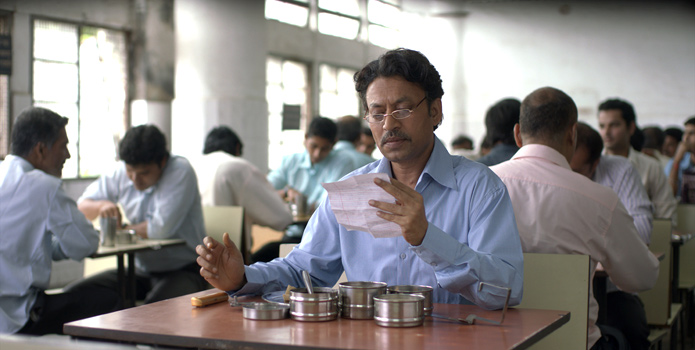 Ila (Nimrat Kaur) is a young Bombay housewife whose marriage is not going well – he doesn’t eat her food, and they have little connection in bed. To spark things up, she decides to make her husband a delicious lunch. It’s sent out each day, along with millions of others, by a complex hand-delivery system connecting her kitchen to her husband’s desk. So she gets her upstair’s neighbour “Auntie” to shout down cooking advice based on what spices she smells through the window. (You never actually see her neighbour.) Later, it comes back completely empty – he loves it! But her husband doesn’t mention anything. Didn’t he like it? He says the cauliflower was good. But she didn’t make cauliflower. So begins a complicated relationship long-distance with a Saajan Fernandez (Irrfan Khan), an unknown, older man, somewhere in Bombay, who loves her cooking. They exchange handwritten messages back and forth under the chapattis in the metal stacked lunch box. Will they meet? Are they meant for each other? Or will Ilo’s husband learn to love his young wife?
Ila (Nimrat Kaur) is a young Bombay housewife whose marriage is not going well – he doesn’t eat her food, and they have little connection in bed. To spark things up, she decides to make her husband a delicious lunch. It’s sent out each day, along with millions of others, by a complex hand-delivery system connecting her kitchen to her husband’s desk. So she gets her upstair’s neighbour “Auntie” to shout down cooking advice based on what spices she smells through the window. (You never actually see her neighbour.) Later, it comes back completely empty – he loves it! But her husband doesn’t mention anything. Didn’t he like it? He says the cauliflower was good. But she didn’t make cauliflower. So begins a complicated relationship long-distance with a Saajan Fernandez (Irrfan Khan), an unknown, older man, somewhere in Bombay, who loves her cooking. They exchange handwritten messages back and forth under the chapattis in the metal stacked lunch box. Will they meet? Are they meant for each other? Or will Ilo’s husband learn to love his young wife?
The Lunch Box is a must-see, a simple, perfect film.
Empire of Dirt, Blue is the Warmest Colour, Young and Beautiful, and the Lunchbox are all showing at TIFF, and will be released in Canada over the next year. Go to tiff.net for tickets.
This is Daniel Garber at the Movies, each Friday morning on CIUT 89.5 FM and on my website, culturalmining.com
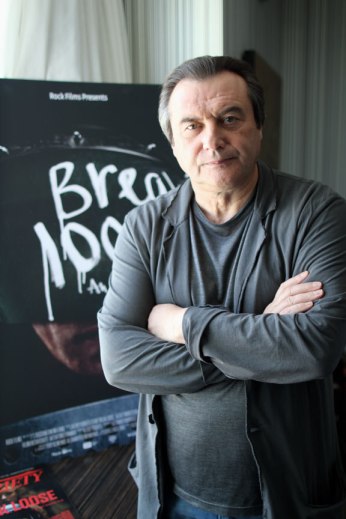
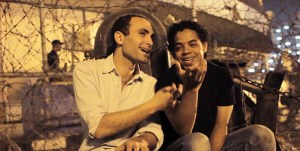
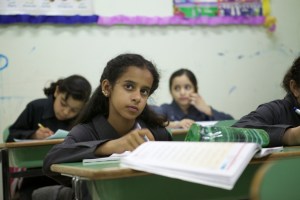






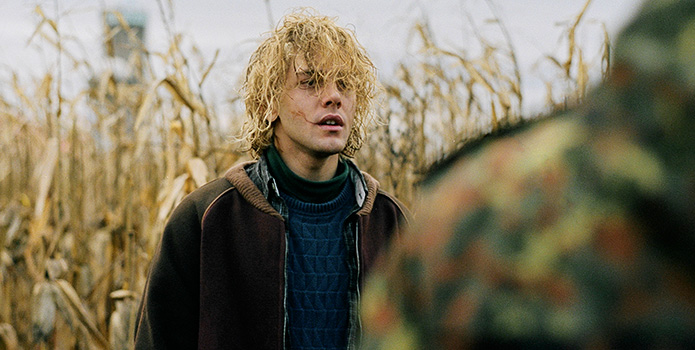

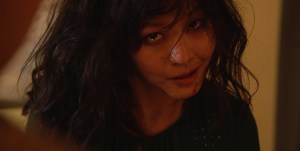




leave a comment